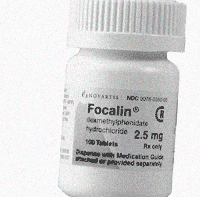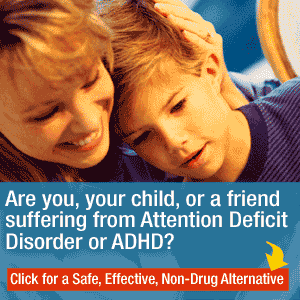Focalin is a chemical variant of methylphenidate, dextro- or dexmethylphenidate, and also comes in an XR version. Naturally, the manufacturer claims it is better than other versions of methylphenidate, but that claim is met with skepticism by many psychopharmacologists. SOURCE: The Essential Guide to Psychiatric Drugs—Rev. and updated (2007).
Focalin Side Effects and Warnings
Updated November 16, 2018
- Brand Names: FOCALIN, FOCALIN XR
- Generic Names: dextro-methylphenidate hydrochloride (HCI), dexmethylphenidate hydrochloride (HCI)
- Category: CEREBRAL STIMULANTS
Focalin is an amphetamine-like prescription stimulant commonly used to treat Attention Deficit Hyperactivity Disorder (ADHD) in children and adults.
Many think Focalin is safe, or mild, because so many children use it. However, the government classifies the psychoactive drug with cocaine and morphine because it is highly addictive.
U.S. DEPT. OF JUSTICE: “Of particular concern is that ADHD literature prepared for public consumption does not address the potential or actual abuse of methylphenidate. Instead, methylphenidate is routinely portrayed as a benign, mild substance that is not associated with abuse or serious side effects. In reality, however, the scientific literature indicates that methylphenidate shares the same abuse potential as other Schedule II stimulants. Further, case reports document that methylphenidate abuse can lead to tolerance and severe psychological dependence.”
FDA “Black Box” Warning Label
The Food and Drug Administration (FDA) requires the following "black box" warning on all methylphenidate drugs, which means that medical studies indicate methylphenidate drugs carry a significant risk of serious, or even life-threatening, adverse effects.
WARNING
FOCALIN-XR IS A FEDERALLY CONTROLLED SUBSTANCE (CII) BECAUSE IT CAN BE ABUSED OR LEAD TO DEPENDENCE. KEEP FOCALIN-XR IN A SAFE PLACE TO PREVENT MISUSE AND ABUSE. SELLING OR GIVING AWAY FOCALIN-XR MAY HARM OTHERS, AND IS AGAINST THE LAW.
TELL YOUR DOCTOR IF YOU OR YOUR CHILD HAVE (OR HAVE A FAMILY HISTORY OF) EVER ABUSED OR BEEN DEPENDENT ON ALCOHOL, PRESCRIPTION MEDICINES OR STREET DRUGS.
ABOVE: FDA black box warning label means that medical studies indicate the drug carries a significant risk of serious or even life-threatening adverse effects. The bold warning label appears on the manufacturer's wholesale packaging and is the strongest alert the FDA can require of drug-makers.
Used For
- Attention deficit disorder
- Narcolepsy
How Focalin Works
We don't know exactly why it produces the effects it does. Methylphenidate was first synthesized in 1944 in an (unsuccessful) attempt to create a stimulant that would not induce addiction or tolerance. Focalin, a methylphenidate drug, is very closely related to amphetamine: similar in chemical structure, metabolization and clinical effects. This close connection is the chief reason methylphenidate drug use raises concern among patients and others.
"Physiological effects of oral cocaine and methylphenidate were similar."
ABOVE: Rush, C.R., et al. "Behavioral pharmacological similarities between methylphenidate and cocaine in cocaine abusers,"
Exp. Clin. Psychopharmacol: Feb;9(1):59-73(2001):
www.ncbi.nlm.nih.gov/pubmed/11519636.
Do Not Use If
You have high blood pressure or any form of heart disease, are very nervous or have severe insomnia, have a history of addiction to drugs or alcohol. FOCALIN and FOCALIN XR should not be taken if you or your child:
- are very anxious, tense, or agitated
- have an eye problem called glaucoma
- have tics or Tourette's syndrome, or a family history of Tourette's syndrome. (Tics are hard to control repeated
movements or sounds.)
- are taking or have taken within the past 14 days an anti-depression medicine called a monoamine oxidase inhibitor or
MAOI.
- are allergic to anything in FOCALIN XR.
The manufacturer also warns: "FOCALIN XR [and FOCALIN] should not be used in children less than 6 years old because it has not been studied in this age group."
Common Side Effects
- Addiction
- Nervousness including agitation, anxiety and irritability
- Trouble sleeping (insomnia)
- Decreased appetite
- Headache
- Stomach ache
- Nausea
- Dizziness
- Heart palpitations
Other Serious Side Effects Include
- slowing of growth (height and weight) in children
- seizures, mainly in patients with a history of seizures
- eyesight changes or blurred vision
Less Common Side Effects
- High blood pressure
- Rapid pulse rate (and other heart problems)
- Tolerance (constant need to raise the dose)
- Feelings of suspicion and paranoia
- Visual hallucinations (seeing things that are not there)
- Depression
- Cocaine craving
- Dermatoses (infected or diseased skin)
- Urinary tract infection
- Infection or viral infection
- Elevated ALT enzyme levels in the blood (signaling liver damage)
FDA Warning: Links Between ADHD Drugs and Priapism and Sexual Dysfunction
In a recent drug-safety announcement, the FDA announced that drugs containing methylphenidate must including warnings about the risk of priapism. (Methylphenidate drugs include: Concerta, Daytrana, Focalin, Metadate, Methylin, Quillivant, and Ritalin.) It's a serious problem: priapism is a persistent, usually painful, erection that lasts for more than four hours and occurs without sexual stimulation. If the condition is not treated immediately, it can lead to scarring and permanent erectile dysfunction.
The FDA included an even stronger warning about atomoxetine (Strattera): “Priapism appears to be more common in patients taking atomoxetine than in patients taking methylphenidate products. Health care professionals should be cautious when considering changing patients from methylphenidate to atomoxetine.”
The safety warning also raised concerns about links between priapism and amphetamine drugs, which include Adderall, Dexedrine, ProCentra and Vyvanse.
ABOVE: U.S. FDA Drug Safety Communication: FDA warns of rare risk of long-lasting erections in males taking methylphenidate ADHD medications and has approved label changes. (12/17/2013).
Overdose Side Effects
Methylphenidate drugs have been extensively abused. Extreme psychological dependence and severe social disability have resulted. Abuse of methylphenidate drugs may cause a sudden heart attack even in those with no signs of heart disease. Symptoms of overdose that require immediate medical assistance include:
- Restlessness
- Tremor
- Aggression
- Hallucinations
- Panic states
- Hyperreflexia (overactive reflexes, which can include twitching or spasms)
- Personality changes
- Symptoms of depression
- Seizures or abnormal EEGs
- High blood pressure
- Rapid heart beat
- Swelling of hands/feet/ankles (for example, numbing of the fingertips)
- Delusions
- Sweating
- Vomiting
- Dehydration
- Unexplained muscle pain
- Lower abdominal pain
- Rhabdomyolysis and kidney damage
- Chronic abuse can manifest itself as psychosis, often indistinguishable from schizophrenia
What to Do About Side Effects
The last dose of the drug every day should be taken several hours before bedtime to prevent insomnia.
Nervousness usually goes away and appetite often returns so that weight loss is rarely dangerous.
If high blood pressure, rapid pulse, paranoia, or tolerance becomes a problem, the drug is usually stopped.
Nothing can be done about the addiction except to remember not to stop taking any version of methylphenidate abruptly.
Focalin and Focalin XR are Schedule II Substances, which means Focalin and Focalin XR have a "high potential for abuse" that "may lead to severe psychological or physical dependence," and the federal government sets limits on the amount of these drugs that may be manufactured each year.
Dependence, Tolerance and Withdrawal
It is possible to build up a tolerance to Focalin, which means the person using the drug needs to take larger doses to achieve the same effect. Over time, the body might come to depend on methylphenidate drugs just to function normally. The person craves the drug and their psychological dependence makes them panic if access is denied, even temporarily.
Withdrawal symptoms can include tiredness, panic attacks, crankiness, extreme hunger, depression and nightmares. Some people experience a pattern of "binge crash" characterized by using continuously for several days without sleep, followed by a period of heavy sleeping.
If It Doesn't Work
The drug should be stopped gradually. Withdrawal symptoms are psychological and stopping suddenly can cause extreme fatigue and severe, even suicidal, depression in adult patients.
Abrupt cessation of stimulant drugs such as methylphenidate drugs can cause extreme fatigue and severe, even suicidal, depression in adult patients.
ABOVE: The Essential Guide to Psychiatric Drugs—Rev. and updated (2007).
If It Does Work
"Also, in addition to increasing heart rate and blood pressure, causing insomnia and weight loss, and sometimes causing psychotic symptoms, the stimulant medications used for ADHD (both methylphenidate drugs and amphetamines) may cause heart disease if taken for a long time. The latter problem led to a debate within the FDA, well covered by newspapers, about whether to issue a special warning to doctors. In the end, the FDA decided not to do this, but the risk remains," reports Jack M. Gorman, M.D., professor of psychiatry at Columbia University and deputy director of the New York State Psychiatric Institute.
The Question of Whether Focalin Impairs Creativity
Methylphenidate drugs (including Focalin) may have subtle impacts on cognitive and intellectual processes. Both parents and researchers have noticed that children taking methylphenidate sometimes answer questions in ways that seem overly compliant or narrow, suggesting the drug might restrict creative thinking. One study found hyperactive children taking methylphenidate offered less varied answers to open-ended questions.
How much do "neuro-enhancing" drugs really help?
And there's the question of what we mean by "smarter."
The psycho-stimulants help students bear down on their work, but with odd effects. One college student says he spends "too much time researching a paper rather than actually writing it--a problem, I assure you, that is common to all
intellectually curious students on stimulants." Another student looked back at papers he'd written while on the drug and found them verbose, "I'd produce two pages on something that could be said in a couple of sentences."
Could Enhancing One Kind of Thinking Exact a Toll on Others?
All these questions need proper scientific answers, but for now much of the discussion is taking place furtively, among an increasing number of Americans who are performing daily experiments on their own brains (or their children's brains).
"It's Not the Real You. It's a Fake Person"
Not all children with ADD feel better on methylphenidate drugs. One teenager said: "It's not the real you. It's a fake person." Another, after being on methylphenidate drugs for seven years, begged his parents not to make him take it, but one of
his teachers would not allow him into her classroom unless he had a note signed by the school nurse that he had received methylphenidate at school that day. The boys complained of dizziness, stomach upset, inability to sleep, a buzzed feeling, and
appetite-loss because of methylphenidate.
ABOVE: Diller, L.H. Running on Ritalin: A Physician Reflects on Children, Society, and Performance in a Pill; Bantam Doubleday Dell Pub. Group, Inc. (1998); citing Feussner, G. "Actual Abuse Issues," Conference Report: Stimulant Use in the Treatment of ADHD, Drug Enforcement Administration, US Department of Justice, Washington DC, Dec. 1996.
Extended-Release Methylphenidate Withdrawal Suspected Association with Sexual Dysfunction
HEALTH CANADA (2006): A 16-year-old boy taking extended-release methylphenidate, with no history of sexual dysfunction, experienced priapism (a painful, persistent and abnormal erection unaccompanied by sexual desire or excitation) that would last up to 24 hours whenever he forgot to take his medication. He had been taking 54 mg of the drug daily for about one year for attention deficit hyperactivity disorder (ADHD) and was not taking any other medications. The priapism would resolve after he took his medication. Treatment with extended-release methylphenidate was continued because the product worked well in controlling his ADHD. The patient did not appear to have any sexual dysfunction when he remembered to take his medication. Priapism is not labeled in the Canadian product monograph.
A case of priapism associated with withdrawal from sustained-release methylphenidate has been reported in the literature.





